 Eczema is a common skin condition that affects millions of children and adults. It causes redness, dryness and flaking on the skin, as well as irritation and itching. Eczema ranges from mild to severe, can come and go and be seasonal or constant.
Eczema is a common skin condition that affects millions of children and adults. It causes redness, dryness and flaking on the skin, as well as irritation and itching. Eczema ranges from mild to severe, can come and go and be seasonal or constant.
Some people have eczema from an early age and outgrow it, others will deal with it throughout their lives. Some suddenly develop it in adulthood.
What Is Eczema?
Eczema is a common skin condition that seems to be a reaction in the body to stress, allergens, inflammation and irritation. Often, there is no one cause that can be pinpointed. “Treating eczema is often about controlling symptoms, avoiding inciting agents and trying to get the inflammation in the skin under control,” explains Dr. Adam Mamelak, board certified Dermatologist at Sanova Dermatology. Topical ointments, changes in exposures and good skin care are approaches that work well.
Can Eczema Be Confused With Squamous Cell Carcinoma Skin Cancer?
Eczema is often widespread, but can also develop as solitary skin lesions. As such, the appearance of eczema can sometimes be confused with skin cancer. This is a problem because it can cause the cancer to be misdiagnosed as eczema, or the other way around.
“Squamous cell carcinoma is often characterized by a reddish, scaly patches on the skin,” states Dr. Mamelak. Lesions can have adherent scale and have a thicker or firmer texture than eczema patches.
If you have never experienced eczema and suddenly find yourself with a patch of scaly, red, inflamed skin, it’s best to see a dermatologist immediately. This is not only to rule out possible skin cancer, but also to get treatment for your skin condition. Eczema can often present as disc-shaped, scaly patches of skin that are confused with other conditions including skin cancer. While they usually aren’t, it is important to see a dermatologist to rule it out.
“If you have never had eczema, you can still develop it at any time in life, however you should quickly get any skin problems looked at and diagnosed,” cautions Dr. Mamelak.
Contact Us
If you have concerns about your skin or questions about skin care and treatments, contact Sanova Dermatology today to book a consultation.
